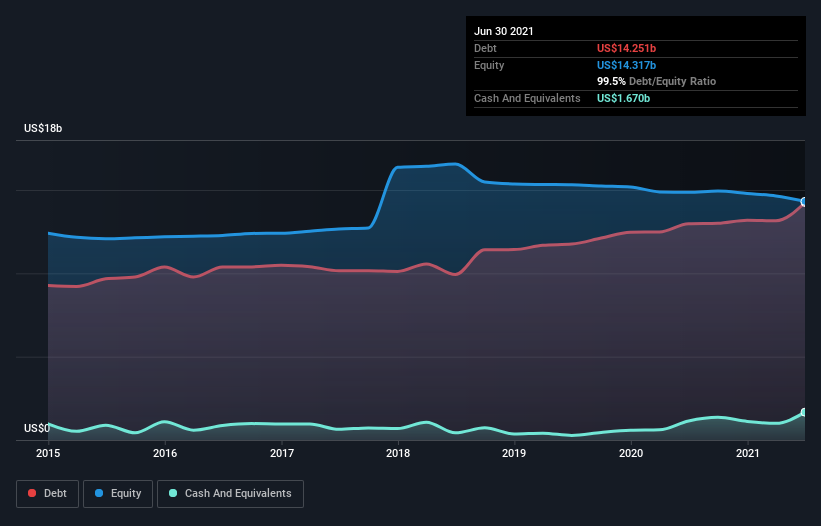- United States
- /
- Transportation
- /
- NYSE:NSC
Here's Why Norfolk Southern (NYSE:NSC) Can Manage Its Debt Responsibly

David Iben put it well when he said, 'Volatility is not a risk we care about. What we care about is avoiding the permanent loss of capital.' It's only natural to consider a company's balance sheet when you examine how risky it is, since debt is often involved when a business collapses. We note that Norfolk Southern Corporation (NYSE:NSC) does have debt on its balance sheet. But is this debt a concern to shareholders?
When Is Debt A Problem?
Debt is a tool to help businesses grow, but if a business is incapable of paying off its lenders, then it exists at their mercy. Ultimately, if the company can't fulfill its legal obligations to repay debt, shareholders could walk away with nothing. However, a more usual (but still expensive) situation is where a company must dilute shareholders at a cheap share price simply to get debt under control. Of course, debt can be an important tool in businesses, particularly capital heavy businesses. The first thing to do when considering how much debt a business uses is to look at its cash and debt together.
Check out our latest analysis for Norfolk Southern
What Is Norfolk Southern's Net Debt?
You can click the graphic below for the historical numbers, but it shows that as of June 2021 Norfolk Southern had US$14.3b of debt, an increase on US$13.0b, over one year. However, it does have US$1.67b in cash offsetting this, leading to net debt of about US$12.6b.

How Healthy Is Norfolk Southern's Balance Sheet?
We can see from the most recent balance sheet that Norfolk Southern had liabilities of US$2.80b falling due within a year, and liabilities of US$21.6b due beyond that. Offsetting these obligations, it had cash of US$1.67b as well as receivables valued at US$941.0m due within 12 months. So its liabilities total US$21.8b more than the combination of its cash and short-term receivables.
This deficit isn't so bad because Norfolk Southern is worth a massive US$68.1b, and thus could probably raise enough capital to shore up its balance sheet, if the need arose. However, it is still worthwhile taking a close look at its ability to pay off debt.
We measure a company's debt load relative to its earnings power by looking at its net debt divided by its earnings before interest, tax, depreciation, and amortization (EBITDA) and by calculating how easily its earnings before interest and tax (EBIT) cover its interest expense (interest cover). The advantage of this approach is that we take into account both the absolute quantum of debt (with net debt to EBITDA) and the actual interest expenses associated with that debt (with its interest cover ratio).
Norfolk Southern has net debt worth 2.4 times EBITDA, which isn't too much, but its interest cover looks a bit on the low side, with EBIT at only 6.5 times the interest expense. While that doesn't worry us too much, it does suggest the interest payments are somewhat of a burden. If Norfolk Southern can keep growing EBIT at last year's rate of 14% over the last year, then it will find its debt load easier to manage. The balance sheet is clearly the area to focus on when you are analysing debt. But it is future earnings, more than anything, that will determine Norfolk Southern's ability to maintain a healthy balance sheet going forward. So if you want to see what the professionals think, you might find this free report on analyst profit forecasts to be interesting.
Finally, a company can only pay off debt with cold hard cash, not accounting profits. So it's worth checking how much of that EBIT is backed by free cash flow. During the last three years, Norfolk Southern produced sturdy free cash flow equating to 53% of its EBIT, about what we'd expect. This free cash flow puts the company in a good position to pay down debt, when appropriate.
Our View
Norfolk Southern's EBIT growth rate was a real positive on this analysis, as was its conversion of EBIT to free cash flow. On the other hand, its net debt to EBITDA makes us a little less comfortable about its debt. Considering this range of data points, we think Norfolk Southern is in a good position to manage its debt levels. But a word of caution: we think debt levels are high enough to justify ongoing monitoring. There's no doubt that we learn most about debt from the balance sheet. However, not all investment risk resides within the balance sheet - far from it. Be aware that Norfolk Southern is showing 1 warning sign in our investment analysis , you should know about...
Of course, if you're the type of investor who prefers buying stocks without the burden of debt, then don't hesitate to discover our exclusive list of net cash growth stocks, today.
If you're looking to trade Norfolk Southern, open an account with the lowest-cost platform trusted by professionals, Interactive Brokers.
With clients in over 200 countries and territories, and access to 160 markets, IBKR lets you trade stocks, options, futures, forex, bonds and funds from a single integrated account.
Enjoy no hidden fees, no account minimums, and FX conversion rates as low as 0.03%, far better than what most brokers offer.
Sponsored ContentValuation is complex, but we're here to simplify it.
Discover if Norfolk Southern might be undervalued or overvalued with our detailed analysis, featuring fair value estimates, potential risks, dividends, insider trades, and its financial condition.
Access Free AnalysisThis article by Simply Wall St is general in nature. We provide commentary based on historical data and analyst forecasts only using an unbiased methodology and our articles are not intended to be financial advice. It does not constitute a recommendation to buy or sell any stock, and does not take account of your objectives, or your financial situation. We aim to bring you long-term focused analysis driven by fundamental data. Note that our analysis may not factor in the latest price-sensitive company announcements or qualitative material. Simply Wall St has no position in any stocks mentioned.
Have feedback on this article? Concerned about the content? Get in touch with us directly. Alternatively, email editorial-team (at) simplywallst.com.
About NYSE:NSC
Norfolk Southern
Engages in the rail transportation of raw materials, intermediate products, and finished goods in the United States.
Solid track record established dividend payer.
Similar Companies
Market Insights
Community Narratives



